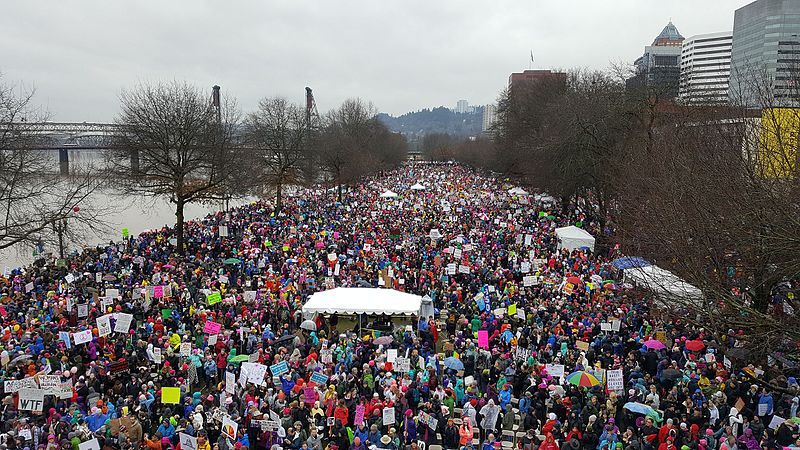Voices to be heard: women around the globe mark International Women’s Day with protests
The feminist movement unites internationally in the face of social, political and reproductive discrimination
March 19, 2021
A holiday to celebrate achievements of women as well as to promote gender equality, Monday, March 8 marked International Women’s Day. As seen on the International Women’s Day [IWD] website, the theme of this year’s campaign is “#ChooseToChallenge” which has been demonstrated internationally as women take their beliefs to the streets.
The notion of “#ChooseToChallenge” means to challenge yourself to become an ally of the movement, someone who can “actively question, reject, and combat exclusionary practices, advocating for populations and communities not their own,” according to BCG.
The IWD describes the entire concept: “A challenged world is an alert world. Individually, we’re all responsible for our own thoughts and actions – all day, every day. We can all choose to challenge and call out gender bias and inequality. We can all choose to seek out and celebrate women’s achievements. Collectively, we can all help create an inclusive world. From challenge comes change, so let’s all choose to challenge.”
Women alike across the world have vocalized their sentiments. Here is a breakdown of events from International Women’s Day 2021.
Poland
Women’s rights activists in Warsaw, Poland object the near ban of abortions. Following the enforcement of pregnancy terminations only allowable in cases of rape, incest or life-threatening danger to the mother, according to the BBC; protestors prepared a “Women’s Day Without Compromise” strike. Movement leaders feel that the country’s Roman Catholic influence is assisting in an attempt to roll back women’s rights.
‘“We are under attack by religious radicals, and this is an international movement. So we women in different countries, we need to face it and fight against it,” says Women’s Strike leader Klementyna Suchanow. “It’s something that is happening to all of us: to Argentinians, to Americans, to Poles, to Croatians.”’
Turkey
Femicide is the gender-based murder of a woman or girl by a man, and exactly what women in Turkey are protesting against. According to the Balkan Insight, protestors sought to spotlight the unacceptable high rate of femicides in the country, as well as the discrepancies in numbers of men versus women in the workforce: “In 2020, 408 women were murdered and hundreds of others assaulted by men. As of March 8 this year, 68 women have been murdered by men, meaning more than one murder for each day in the first quarter of the year.”
Turkish women held protests beginning the Friday before the holiday, and between only the Saturday and Sunday of that weekend, there had been two additional murders as well as a woman almost beaten to death by her husband.
Turkish women are also drawing attention to the difference in numbers of men versus women in the labor force, in which it was outlined in “the Women in 2020” report of the Turkish Statistical Agency, TurkStat, published each International Women’s Day: “Only 28.7 percent of women in Turkey participate in the labour force and women also stay in the labour force only for an average of 19 years.” Following the protest gatherings, the “Istanbul government office on Monday shut down metros, trams and funicular routes leading to the city’s famous Taksim Square, in what looked like a concerted attempt to cut the number of people taking part in International Women’s Day rallies.”
France
Women, as well as men, in France gathered on March 8 to denounce the gender pay gap. Gender equality movements and organizations such as the Osez le féminisme, Les Effrontées and Unef have encouraged both men and women to leave work at 3:40 PM in order to go on strike against the wage gap. A demonstration in Paris began at 1 PM in Port-Royal in preparation to move towards the Place de la République, according to The Local: ‘“On March the 8th, we will be on strike along with women all over the world to refuse to pay the price of the crisis with our jobs, our salaries, our bodies,’ several unions including the CGT, FSU and Solidaires said in press conferences.”
Mexico
Women in Mexico protested exponential femicide rates to a neglecting government. The Washington Post reports that “nearly 1,000 women in Mexico were victims of femicide in 2020, according to an official database, the Guardian reported. Some of the cases have been particularly brutal: In February 2020, 25-year-old Ingrid Escamilla was stabbed to death, cut up and partially skinned … Activists say he’s [President Andrés Manuel López Obrador] failed to take rampant sexual violence seriously, even as it’s led to the deaths of 10 women a day.”
Women protested in Mexico City where police were prepared with a barricade around the presidential palace, in which “protesters said the barrier was symbolic of the president’s refusal to take on the issue.” Women ornamented the barrier with names of femicide victims as well as feminist anti-violence slogans in commemoration of the lives lost. Women demand an end to violence against women as the number of victims continue to rise, resorting to protests as they become a final plea for government attention on the matter.
Different cultures and countries around the world have brought attention to the issue as they raise their voices against gender inequality. Whether the fight be against femicide or unequal pay, women are looking more and more like a united front against the discrimination across the globe.







